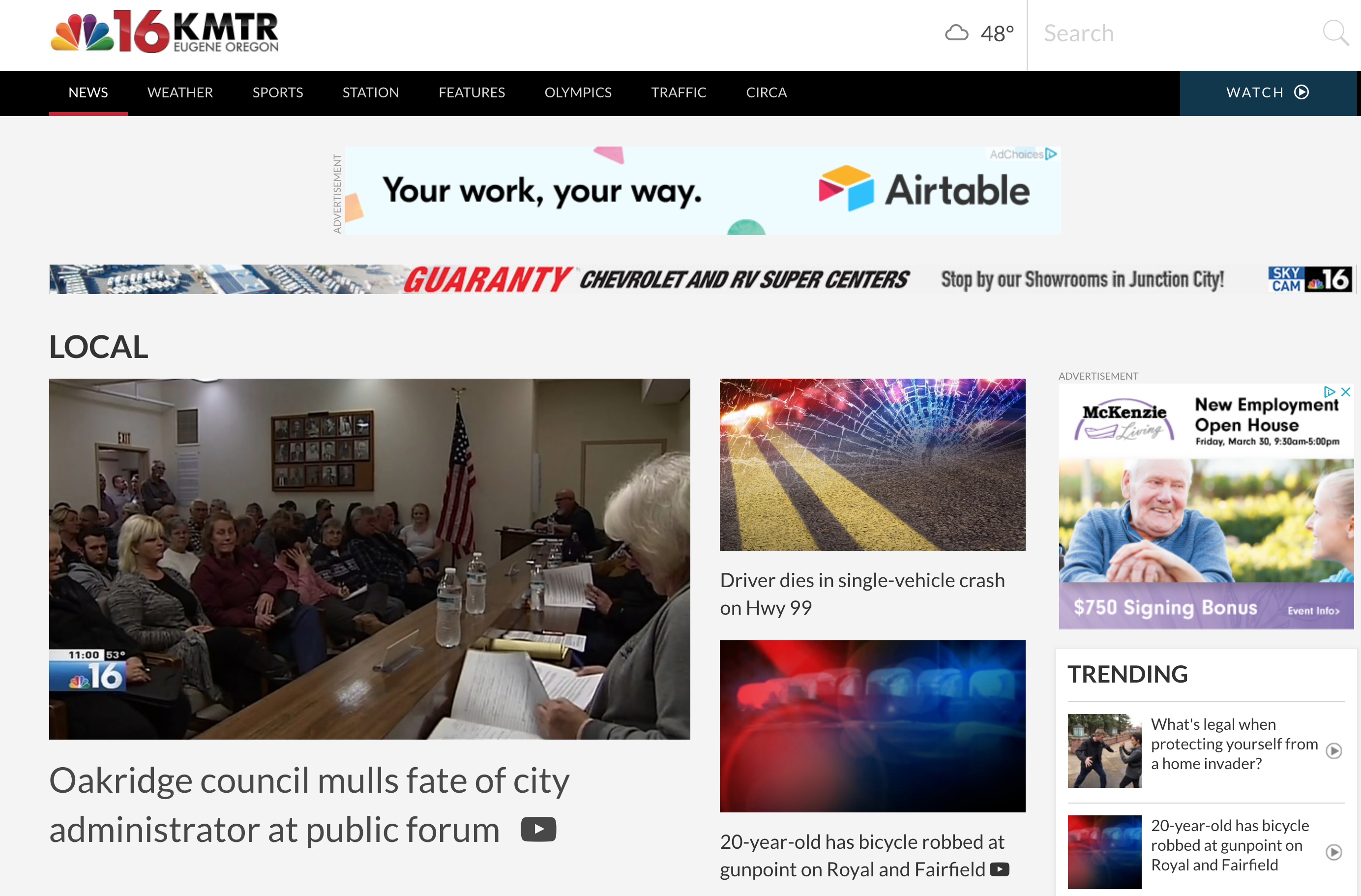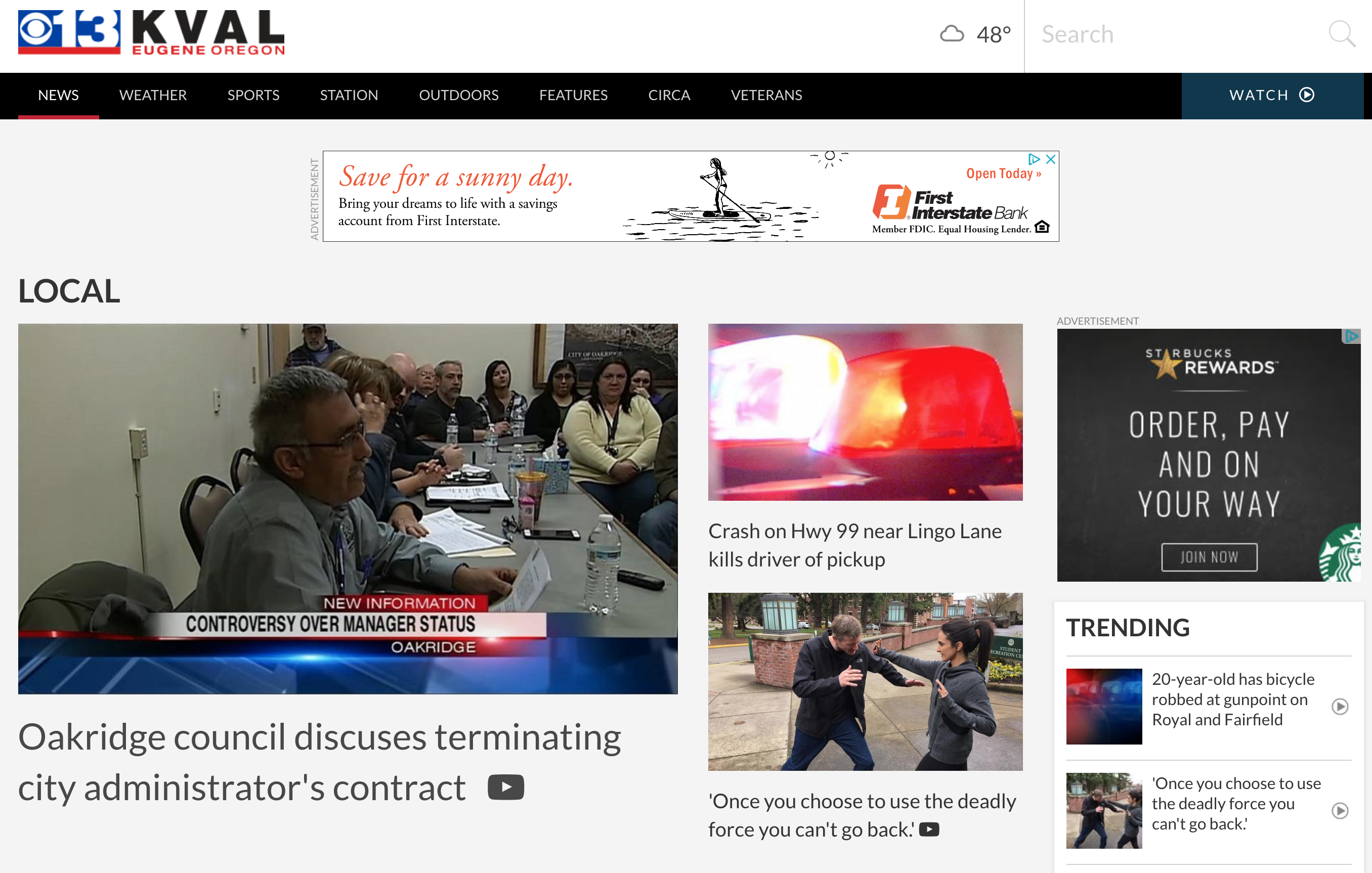
Sinclair Broadcasting started in 1971 with a radio station and single TV station, WBFF-TV in Maryland. Now Sinclair is a media behemoth with stations across the country, including here in Eugene.
Locally, Sinclair owns KVAL and runs KMTR through a “shared services” agreement that allows the stations to save money. Shared services agreements have led to concerns that such business arrangements may violate Federal Communications Commission (FCC) ownership policies. Locally, this sharing of services means the two stations’ websites are virtually identical.
According to the FCC, “Sinclair owns or operates 173 broadcast television stations, consisting of 528 channels, in 81 markets, with affiliations with all major networks, and is the largest local news provider in the country.”
And, the FCC says, Sinclair is in the process of buying the Tribune Media Company, which owns or operates “42 broadcast television stations in 33 markets, also with affiliations with all major networks.”
This would mean that Sinclair would reach 72 percent of American households with its news and, for an added bonus, Sinclair supplies content.
Sinclair provides “must-run” commentaries such as “Bottom Line with Boris” that weigh in on politics with expertise — Russian-born Boris Epshteyn, now a chief political analyst at Sinclair, was a senior advisor to Donald Trump’s 2016 campaign for president.
Epshteyn’s commentaries replace Mark Hyman’s “Behind the Headlines,” which included advice for “snowflakes” going to college like: “And about that demand for a safe space. You have one. It’s not the entire campus. It’s your dorm room. Not grown-up enough to deal with the facts? Then hunker down in your room and Snapchat the day away with other social justice warriors.”
The commentaries are run as part of the newscast.
Epshteyn told Variety that the criticism of his presence in Sinclair’s newscasts stems from “bias against the company from mainstream media.”
CNN recently pointed out that Sinclair news anchors were told they would need to tape segments expressing their concerns about “the troubling trend of irresponsible and one-sided news stories plaguing our country.”
Update: After this story was posted, Deadspin posted a video of hundreds of Sinclair anchors reading the same promo CNN pointed to parroting the words of Donald Trump about “fake news.”
Sinclair had previously supplied the lines for its anchors to read, as John Oliver pointed out in a biting 18-minute commentary about Sinclair last summer.
David Smith, the son of founder Julian Sinclair Smith, is the executive chairman and chairman of the board, and he and three other Smith sons have voting shares in the company. Salon reports that in 1996, after being arrested in a prostitution sting, as part of his plea agreement, David Smith “ordered his newsroom employees to produce a series of reports on a local drug counseling program, which counted toward Smith’s court-ordered community service.”
Not everyone appreciates Sinclair’s supplied content. The FCC levied a more than $13 million fine last year on the company for its 1,723 on-air segments about the Huntsman Cancer Institute (paid for by the Huntsman Cancer Foundation, a fact Sinclair neglected to disclose) across 64 of its local TV stations around the country.
One of Sinclair’s efforts, female- and millennial-focused Circa News, was called one of Donald Trump’s “new besties” by website The Root, which also says, “What if Breitbart and Fox News had a couple of babies? What if they grew up to be a cool, slicker version of their parents and started becoming more powerful?”
Circa was studied by Harvard’s Nieman Lab, which pointed out that Circa under Sinclair’s leadership has “a tendency for its stories to be picked up by Fox News.”
Those curious about the Circa news app can find it at the top of both KMTR and KVAL’s websites.
Enlarge

Enlarge

A Note From the Publisher

Dear Readers,
The last two years have been some of the hardest in Eugene Weekly’s 43 years. There were moments when keeping the paper alive felt uncertain. And yet, here we are — still publishing, still investigating, still showing up every week.
That’s because of you!
Not just because of financial support (though that matters enormously), but because of the emails, notes, conversations, encouragement and ideas you shared along the way. You reminded us why this paper exists and who it’s for.
Listening to readers has always been at the heart of Eugene Weekly. This year, that meant launching our popular weekly Activist Alert column, after many of you told us there was no single, reliable place to find information about rallies, meetings and ways to get involved. You asked. We responded.
We’ve also continued to deepen the coverage that sets Eugene Weekly apart, including our in-depth reporting on local real estate development through Bricks & Mortar — digging into what’s being built, who’s behind it and how those decisions shape our community.
And, of course, we’ve continued to bring you the stories and features many of you depend on: investigations and local government reporting, arts and culture coverage, sudoku and crossword puzzles, Savage Love, and our extensive community events calendar. We feature award-winning stories by University of Oregon student reporters getting real world journalism experience. All free. In print and online.
None of this happens by accident. It happens because readers step up and say: this matters.
As we head into a new year, please consider supporting Eugene Weekly if you’re able. Every dollar helps keep us digging, questioning, celebrating — and yes, occasionally annoying exactly the right people. We consider that a public service.
Thank you for standing with us!

Publisher
Eugene Weekly
P.S. If you’d like to talk about supporting EW, I’d love to hear from you!
jody@eugeneweekly.com
(541) 484-0519